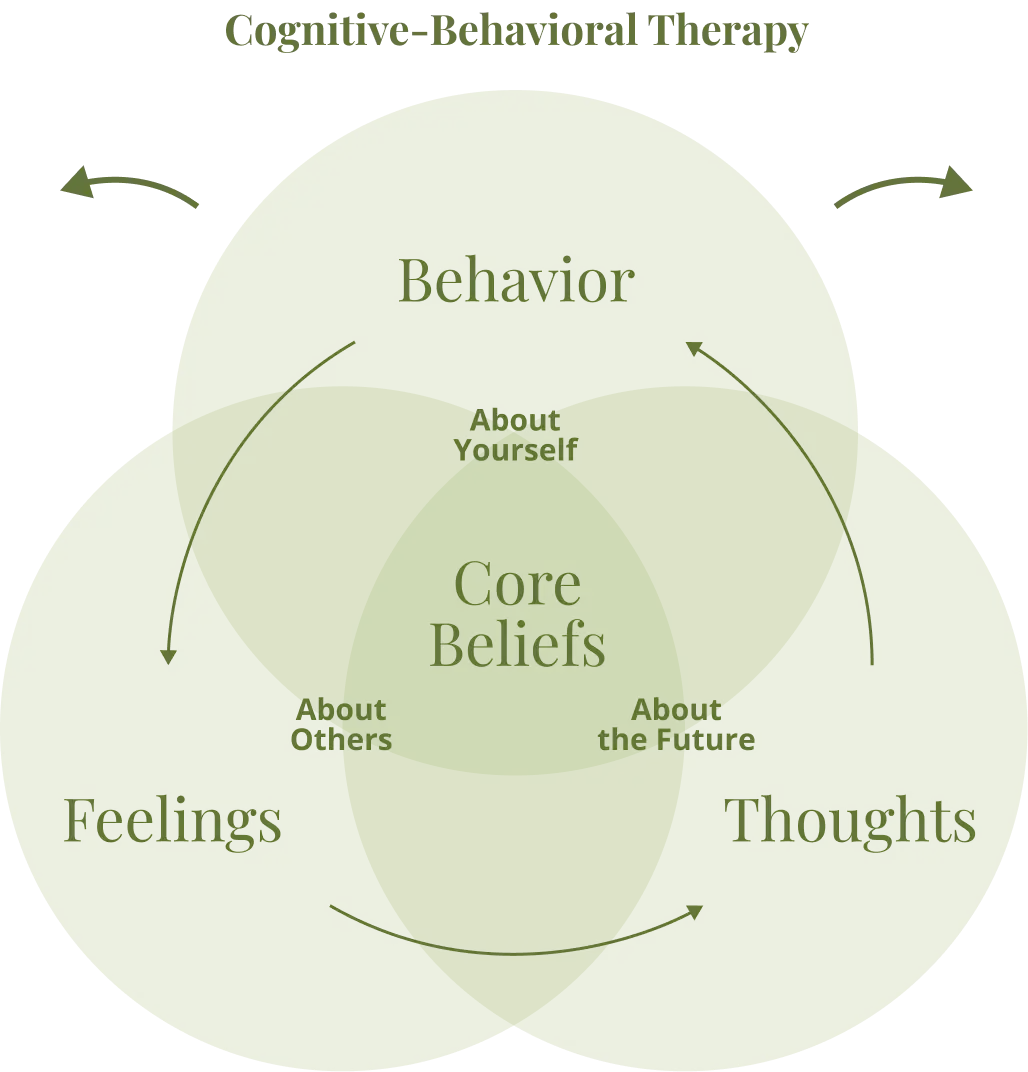Cognitive-Behavioral Therapy
Home » Our Services » Cognitive-Behavioral Therapy
At Arcara Personalized Psychiatry, we use proven methods like cognitive-behavioral therapy (CBT) to help you feel more in control from the very first appointment. With over 30 years of combined experience in Boston psychiatric care, we provide comprehensive evaluations, assessments, and mental health services tailored to adults.
What Is Cognitive-Behavioral Therapy?
Cognitive-behavioral therapy helps you understand how your thoughts, feelings, and behaviors are connected. By breaking larger problems down into smaller, more manageable parts, challenges feel less overwhelming.
CBT is one of the most well-researched and effective forms of therapy available. It’s backed by decades of clinical evidence, working well both on its own and alongside other treatment methods.
CBT is proven to help with:
- Anxiety and panic attacks
- Depression and low mood
- PTSD and past trauma
- Stress and overwhelm
- Unhelpful thinking patterns
CBT focuses on what you’re facing right now and teaches practical skills that can be used every day. Whether you’re dealing with a diagnosed condition or simply want better coping tools for stressful moments, CBT can help you feel steadier and more in control.


CBT Principles Include:
- Unhelpful thoughts can contribute to emotional distress
- Repeated patterns of behavior can worsen mental health
- Learning coping tools can reduce symptoms over time
- Adjusting daily habits can support long-term recovery
CBT Techniques Include:
- Spotting thought patterns that may not reflect reality
- Reframing negative beliefs with more balanced thinking
- Understanding how other people’s actions affect your emotions
- Building problem-solving skills and self-confidence
CBT Tactics Include:
- Practicing role-play for difficult conversations or triggers
- Facing fears gradually instead of avoiding them entirely
- Learning how to calm your body and quiet your mind
- Applying relaxation exercises to reduce physical tension
The Benefits of CBT Therapy

- Helps you understand how your thoughts affect your emotions and actions
- Gives you tools to manage stress, anxiety, and low moods more effectively
- Improves decision-making during challenges and high-pressure moments
- Supports lasting change by teaching new ways to think and respond to triggers
- Builds emotional awareness and stronger self-confidence over time
- Encourages healthier habits that improve both mental and physical well-being
What to Expect at Therapy
Your CBT journey starts with a simple questionnaire to help track your progress and guide your care. In your first session, which lasts for a full hour, you talk with your provider about what’s been challenging and what you’d like to work on.
Together, you’ll set goals and begin identifying thought patterns that may be keeping you stuck. Examples include emotional reasoning (“They’re upset, so it must be my fault”) or black-and-white thinking (“If I’m not perfect, I’ve failed”).
CBT sessions are typically 30 minutes long, held once a week, and often run for 12 to 20 weeks. Whether you meet in person or online, your therapist will help you build skills that you can use for life. From reframing unhelpful thoughts to facing fears and staying grounded during stressful moments, these skills improve your mood, relationships, and daily decision-making.

Types of Therapy
Cognitive-behavioral therapy includes several structured approaches that help reshape unhelpful thoughts and behaviors. While the individual techniques do differ, all focus on breaking the cycle of negative thinking to improve mental health outcomes.
Dialectical Behavior Therapy (DBT)
Combines mindfulness with emotion regulation to support better reactions and self-awareness.
Cognitive Therapy
Helps identify distorted thinking and teaches healthier ways to manage emotions and actions.
Rational Emotive Behavior Therapy (REBT)
REBT challenges irrational beliefs and replaces them with more balanced, realistic thoughts.
Multimodal Therapy
Addresses seven key areas: thoughts, behaviors, emotions, body sensations, images, medications, and relationships.
What Happens Afterwards?
Cognitive-behavioral therapy doesn’t erase the challenges you face, but it can help you respond to them with more clarity and resilience. Over time, your thinking can shift; what once felt too big may start to feel manageable.
Outside of sessions, your therapist may give you light homework to reinforce progress. These could include:
- Reflective writing to process thoughts and emotions
- Exercises that help strengthen behavioral and coping skills
- Short readings to support what you’re learning in therapy
These assignments help you apply what you’ve learned in daily life, building confidence in your ability to manage difficult thoughts and emotions.

Take the Next Step With Confidence
At Arcara Personalized Psychiatry, we believe therapy is more than just talk. It’s a process of learning, healing, and becoming more connected to yourself. With experienced nurse practitioners, longer appointments, and deeply personalized care, we’re here to support you every step of the way.
If you’re ready to feel more grounded, focused, and in control, call us today or request an appointment.
Contact Form
FAQs
Is CBT suitable for children and teens?
Yes. While Arcara treats adults, CBT can help younger people manage anxiety, low mood, or focus issues when used by trained professionals.
What mental health issues does CBT treat best?
CBT works well for anxiety, depression, PTSD, OCD, and eating or sleep issues. At Arcara, it’s part of our personalized approach to care.
How does CBT help with anxiety?
It helps you notice anxious thoughts, calm your response, and slowly face fears so they feel less overwhelming over time.
How does CBT help with depression?
It breaks the cycle of negative thinking. You learn to identify unhelpful beliefs and replace them with realistic, hopeful ones.
Does CBT work for OCD and ADHD?
Yes. CBT reduces OCD compulsions and helps people with ADHD build focus, routine, and emotional control.
How well does cognitive-behavioral therapy treat symptoms of complex PTSD?
CBT can ease symptoms, especially when paired with trauma-informed care and extra support tailored to your needs.
Is CBT scientifically proven to work?
Yes. Decades of research show CBT is one of the most effective therapies for a wide range of mental health issues.
How long does CBT take to show results?
Many people notice a shift within a few sessions. You’ll often start seeing progress by weeks 6 to 8 with consistent care.
Why doesn’t CBT work for everyone?
It works best if you’re ready to engage. Some may need other support first, or a different starting point.
How to find the best CBT therapist near me?
Look for someone qualified who makes you feel comfortable. At Arcara, our team offers longer sessions and truly personal care.